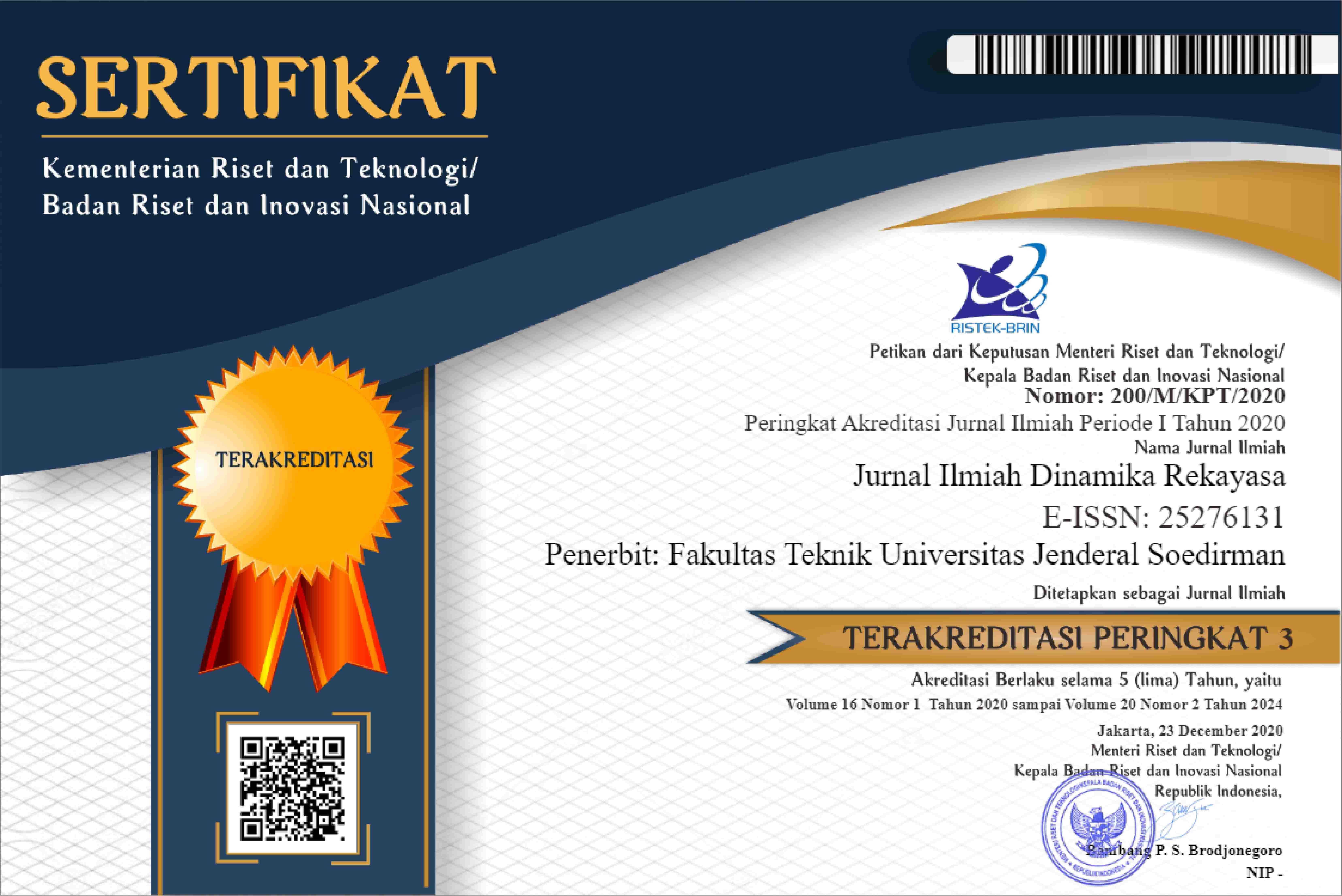The effect of plastic shape in improving asphalt mixture performance
DOI:
https://doi.org/10.20884/1.dinarek.2025.21.1.112Keywords:
Asphalt Modification, Dry Mixing Method, Plastic Shape.Abstract
Indonesia is one of the eight largest plastic waste-producing countries, generating 3.4 million tons annually. Most of this waste remains underutilized and ends up in landfills. A potential solution is incorporating plastic waste into asphalt mixtures to enhance road performance. This method not only reduces plastic waste accumulation but also improves road durability and crack resistance. This study examines the effects of different LDPE plastic forms pellets, shredded, and powder on asphalt performance under optimal plastic content. The dry mixing method was chosen for its ease of field application, where plastic is added to hot aggregates before mixing with hot asphalt. Asphalt with 5% binder was modified using LDPE pellets at 3%, 5%, 7%, and 9%. After determining the optimal plastic content at 9%, further modifications were conducted using shredded and powdered LDPE. Marshall test results showed no significant stability differences among the plastic forms, but LDPE pellets achieved the highest stability, increasing conventional asphalt stability by up to 20% at 5% binder content. The highest flow was also observed in the LDPE pellet mixture, increasing by 0.18 mm. These findings suggest that using LDPE pellets enhances asphalt crack resistance.
Downloads
References
World Population Review. (2024). Plastic Pollution by Country 2024. World Population Review.
Angelone, S., Cauhapé Casaux, M., Borghi, M., & Martinez, F. O. (2016). Green pavements: reuse of plastic waste in asphalt mixtures. Materials and Structures/Materiaux et Constructions, 49(5), 1655–1665. https://doi.org/10.1617/s11527-015-0602-x
Pangestika, S. H., Saptaji, K., Redi, A. A. N. P., Nandiyanto, A. B. D., Liman, S. D., & Triawan, F. (2023). Utilization of plastic waste to improve properties of road material: A review. In Mechanical Engineering for Society and Industry (Vol. 3, Issue 3, pp. 120–136). Universitas Muhammadiyah Magelang. https://doi.org/10.31603/mesi.10133
Susanto, I., & Suaryana, N. (2019). Evaluasi Kinerja Campuran Beraspal Lapis Aus (AC-WC) dengan Bahan Tambah Limbah Plastik Kresek. Jurnal Aplikasi Teknik Sipil, 17(2). https://iptek.its.ac.id/index.php/jats/article/view/4980
Bagampadde, U., K. D., K. B. M. (2013). Evaluation of rheology and moisture susceptibility of asphalt mixtures modified with low density polyethylene. Int. J. Pavement Res. Technol, 6(3), 217–224.
Maharaj, R., Maharaj, C., & Hosein, A. (2018). Rean Maharaj, Chris Maharaj and Areo Hosein 20 Progress in Rubber. In Plastics and Recycling Technology (Vol. 34, Issue 1).
Fang, C., Yu, R., Li, Y., Zhang, M., Hu, J., & Zhang, M. (2013). Preparation and characterization of an asphalt-modifying agent with waste packaging polyethylene and organic montmorillonite. Polymer Testing, 32(5), 953–960. https://doi.org/10.1016/j.polymertesting.2013.04.006
Rincón-Estepa, J. A., González-Salcedo, E. V., Rondón-Quintana, H. A., Reyes-Lizcano, F. A., & Bastidas-Martínez, J. G. (2022). Mechanical Behavior of Low-Density Polyethylene Waste Modified Hot Mix Asphalt. Sustainability (Switzerland), 14(7). https://doi.org/10.3390/su14074229
Nizamuddin, S., Boom, Y. J., & Giustozzi, F. (2021). Sustainable polymers from recycled waste plastics and their virgin counterparts as bitumen modifiers: A comprehensive review. Polymers, 13(19), 1–51. https://doi.org/10.3390/polym13193242
Favian Gian. (2022). Pengaruh Ukuran Potongan Plastik HDPE Terhadap Karakteristik Marshall Campuran Laston Ac-Wc Menggunakan Fillersemen Portland [Universitas Islam Riau]. https://repository.uir.ac.id/9553/
Kementerian Pekerjaan Umum dan Perumahan Rakyat. (2018). Spesifikasi Umum 2018 untuk Pekerjaan Konstruksi Jalan dan Jembatan (Revisi 2).
Badan Standarisasi Nasional. (2018). Metode uji stabilitas dan pelelehan campuran beraspal panas dengan menggunakan alat Marshall. www.bsn.go.id
Mohammed, S. A., Ahmad, A. G., Santiagoo, R., Vijean, V., Ahmad, W. A. A. W., Ahmad, R., & Kai, L. S. (2023). Optimum Binder Content of Asphaltic Concrete (ACW14) Mixture Incorporating Limestone. IOP Conference Series: Earth and Environmental Science, 1216(1). https://doi.org/10.1088/1755-1315/1216/1/012020
Li, J., Li, P., Su, J., Xue, Y., & Rao, W. (2019). Effect of aggregate contact characteristics on densification properties of asphalt mixture. Construction and Building Materials, 204, 691–702. https://doi.org/10.1016/j.conbuildmat.2019.01.023
Saputro Dedy, Suparma Budi, & Satyarno Iman. (2022). Pengaruh Proses Pencampuran Kering dan Basah Terhadap Kekesatan Ac-Wc Limbah Plastik. Jurnal Transportasi, 22(Vol. 22 No. 2 (2022)), 97–108. https://doi.org/https://doi.org/10.26593/jtrans.v22i2.6060.97-108
Wu, S., & Montalvo, L. (2021). Repurposing waste plastics into cleaner asphalt pavement materials: A critical literature review. In Journal of Cleaner Production (Vol. 280). Elsevier Ltd. https://doi.org/10.1016/j.jclepro.2020.124355
Duarte, G. M., & Faxina, A. L. (2021). Asphalt concrete mixtures modified with polymeric waste by the wet and dry processes: A literature review. In Construction and Building Materials (Vol. 312). Elsevier Ltd. https://doi.org/10.1016/j.conbuildmat.2021.125408
Brasileiro, L., Moreno-Navarro, F., Tauste-Martínez, R., Matos, J., & Rubio-Gámez, M. del C. (2019). Reclaimed polymers as asphalt binder modifiers for more sustainable roads: A review. Sustainability (Switzerland), 11(3). https://doi.org/10.3390/su11030646
Zoo Zoorob, S. E., & Suparma, L. B. (2000). Composites Laboratory design and investigation of the properties of continuously graded Asphaltic concrete containing recycled plastics aggregate replacement (Plastiphalt). In Cement & Concrete Composites (Vol. 22). www.elsevier.com/locate/cemconcomp
Direktorat Jenderal Bina Marga. (2017). Campuran Beraspal Panas Menggunakan Limbah Plastik.





